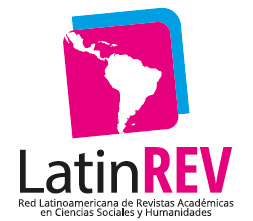La presente ausencia de una generación
La revista GAS y la escena del rock uruguayo de la posdictadura
DOI:
https://doi.org/10.26422/aucom.2025.1401.delPalabras clave:
rock uruguayo, revistas alternativas, posdictadura uruguaya, escena musical uruguayaResumen
Entre las publicaciones alternativas de la posdictadura en Uruguay, GAS se destacó por una permanencia sostenida, así como por la integración de su staff, donde varios de sus integrantes y colaboradores fueron músicos de rock o periodistas de la prensa tradicional. Este artículo analiza la participación de GAS en la emergente escena musical montevideana. Con este objetivo, se presentan nociones de escena musical, de publicaciones alternativas y de generación para analizar las huellas de una edición “autentica” presentes en la revista, que corresponden con las presentaciones “auténticas” y espontáneas de los músicos de rock en el escenario. Finalmente, se analiza el éxito de la revista como resultado de una articulación efectiva entre un discurso generacional y los elementos de la cultura punk.
Descargas
Referencias
Bayce, R. (1986) La lógica del miedo 1968-1984: génesis y consolidación. Relaciones, n. 20/21.
Bennett A. y Peterson R.A. (2004) Introducing music scenes. En Bennett A. y Peterson R.A. (Ed.), Music scenes. Local, Translocal and Virtual (pp. 1-17). Vanderbilt University Press.
Casanova, G. [Veromode] Mamá era punk. [Video] Youtube. https://www.youtube.com/results?search_query=mama+era+punk
Clarke, J. et al. (2003) [1975] Subcultures, cultures and class. En Hall, S. y Jefferson, T. Tony (Ed.) Resistance through Rituals: Youth Subcultures in post-war Britain. Working Papers in Cultural Studies (pp. 9-74). The Center for Contemporary Cultures Studies. Routledge.
Comisión Interamericana de Derechos Humanos – OEA (2024). El sistema normativo relacionado con la protección de los derechos humanos. Disponible en https://cidh.oas.org/countryrep/Uruguay78sp/cap.7.htm#:~:text=El%20Decreto%20No.,podr%C3%A1%20ejercerse%20con%20previa%20autorizaci%C3%B3n.
Cosso, P. (2015). El movimiento punk de Buenos Aires. Entre la dictadura y la “posdictadura”. En Cosso P. y Giori, P. (Comp.) Sociabilidades punks y otros marginales. Memorias e identidades (1977-2010) (pp. 55-94). Tren en Movimiento.
Couto, T. (2019). La era del casete. Escritos del rock uruguayo 1985-1995. Ediciones B.
De Alencar Pinto (1995). Razones locas. El paso de Eduardo Mateo por la música uruguaya. La Pluma.
De Certeau, M. (1988) The Practice of Everyday Life. University of California Press.
Delgado, L. (2014). El rock son los padres: cultura juvenil en los ochenta montevideanos. Delgado, L. (Ed.) Comunicación y cultura en los ochenta. Cuadernos de Historia 13, 115-133.
Delgado, L. (2016a) La subcultura del rock montevideano en la crítica musical y cultural de los ochenta (1983-1987). Encuentros Uruguayos IX (1), 111-130.
Delgado, L. (2016b) Rock de los ochenta en sociedad. Encuentro y desencuentro de dos generaciones. Dixit 24, 51-69.
Delgado, L. (2018) El David en pañales. Censura e intervención urbana en la posdictadura. Cuadernos del Claeh 37 (108), 9-30.
Delgado L. y Farachio F. (2021). Eléctrico, auténtico y precario: el sonido y los nuevos públicos en los espectáculos de rock de los ochenta montevideanos. Austral Comunicación 10 (2), 461-483.
Duncombe, S. (2008) [1997]. Notes from the underground: zines and the politics of alternative culture (Segunda edición) Microcosm.
Eshun, K. (2016). The Weakest Link in Every Chain, I always Want To Find It. Green Cartside in Conversation with Kodwo Eshun. En Butt, G., Eshun, K. y Fisher, M. (Ed.) Post punk then and now. Repeater, s/p.
Farachio, F. (2015). Polémica sobre el rock nacional en cinco semanarios uruguayos (1985-1987) [Trabajo Final de Grado]. Universidad Católica del Uruguay.
Ferrer, F (2007). Memorias de una generación ausente y solitaria: revistas subterráneas de finales de los 80 en Montevideo [Trabajo Final de Carrera]. Universidad ORT. https://sisbibliotecas.ort.edu.uy/cgi-bin/koha/opac-detail.pl?biblionumber=65883&query_desc=an%3A%2222720%22.
Forlán Lamarque, R. (1987). “Gas Subterráneo”: Nacidos en los ‘60. La Semana. Suplemento de El Día. 3 de octubre.
Frank, T. (1998) The Conquest of Cool: Business Culture, Counterculture, and the Rise of Hip Consumerism. University of Chicago Press.
González, E. y Pérez D. (Comp.) (2022). Bajo tierra. Cartografía incompleta de revistas subte y fanzines en el Uruguay de la posdictadura (1986-1990). Alter.
Hall, S. y Whallen, P. (1998). The Young Audience. En Storey, J. (Ed.) Cultural Theory and Popular Culture. A Reader (pp. 61-67). Prentice Hall.
Hodgkinson, J.A. (2004). The Fanzine Discourse over Post-Rock. En Bennett A. y Peterson R.A. (Ed.) Music scenes. Local, Translocal and Virtual (pp. 221-237). Vanderbilt University Press.
Locarnini, M. y Tuja, M. (2015). Medios y contracultura: el caso de los fanzines punk en Buenos Aires. En Cosso P. y Giori, P. (Comp.) Sociabilidades punks y otros marginales. Memorias e identidades (1977-2010) (pp. 143-188). Tren en Movimiento.
Maffesoli. M. (1990). El tiempo de las tribus. Icaria.
Magalhaes, H. (1993) O que é fanzine. Editora Brasiliense.
Malaneschii, R. (2024). Los tontos. Estuario.
Mannheim, K. (1993) [1998]. El problema de las generaciones. REIS 62, 193-244.
Marcus, G. (1993). Rastros de carmín. Una historia secreta del siglo XX. Anagrama.
Markarian, V. (2012). El 68 uruguayo. El movimiento estudiantil entre molotovs y música beat. Universidad Nacional de Quilmes.
Moore, A. (2002). Authenticity as Authentication. Popular Music 21(2), pp. 209-223
Nora, P. (2008). Pierre Nora en Les lieux de mémoire. Trilce.
Payra, M.L. (2018). Relevamiento: Montevideo Rock y sus repercusiones. [Trabajo Final de Grado]. Universidad Católica del Uruguay.
Pedro, J., Piquer, R. del Val, F. (2018). Repensar las escenas musicales contemporáneas: genealogía, límites y aperturas. Cuadernos de Etnomusicología 12. Disponible en https://www.sibetrans.com/etno/public/docs/8-dossier-escenas-josep-ruth-fernan_1.pdf.
Peláez, F. (2002). De las cuevas al Solís. Cronología del rock en Uruguay. Perro Andaluz.
Petra, A. (2015). Anarquistas: cultura y lucha política en Buenos Aires. El anarquismo como estilo de vida. En Cosso P. y Giori, P. (Comp.) Sociabilidades punks y otros marginales. Memorias e identidades (1977-2010) (pp. 11-54). Tren en Movimiento.
Phillipov, M. (2006). Haunted by the Spirit of ’77: Punk Studies and the Persistence of Politics. Continuum. Journal of Communication & Cultural Studies 20(3), 383-393.
Rodríguez, M. (2012). En la noche: el rock uruguayo postdictadura (1982-1989). Fin de Siglo.
Schmied, A. (2018) (Ed.). Libro de fanzines. Tren en Movimiento.
Williams, R. (1998). The Analysis of Culture. En Storey, J. (Ed.) Cultural Theory and Popular Culture. A Reader (pp. 48-56). Prentice Hall.
Publicado
Número
Sección
Licencia
Los autores conservan los derechos de autor y garantizan a la revista el derecho de ser la primera publicación del trabajo. En caso de que puedan publicar en otra revista una traducción del artículo ya publicado en Austral Comunicación, se pide dejar constancia en la versión traducida sobre la publicación original.
La licencia utilizada es CC BY-NC-SA, que permite compartir (copiar y redistribuir el material en cualquier medio y formato) y adaptar (remezclar, transformar y construir sobre el material) bajo los siguientes términos: atribución (reconocer la autoría) y no comercial (no se puede utilizar el material para fines comerciales). Actualización: 1 de febrero de 2022.
Austral Comunicación permite al autor(es) retener los derechos de publicación sin restricciones.









































